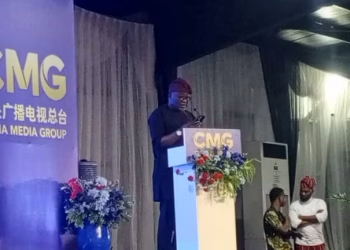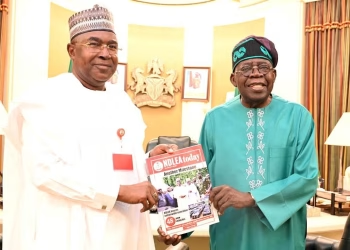

The Niger Delta region of Nigeria is considered by many as the golden basket of the nation in view of the crude oil deposit in the area which is also regarded as the main-stay of Nigeria’s economy.
The effects of oil exploration also has its effect of the people and the climate condition of the area; and has also raised a lot of agitation from within and outside the region.
To address this concerns, government has been responding by setting up special intervention agencies to address the concerns and problems of development in the area. In the military era we had agency like OMPADEC, when the civilian regime came in 1999, the pedestal was raised, giving birth to the Niger Delta Development Agency, NDDC.
The Niger Delta Development Commission, NDDC was established by President Olusegun Obasanjo in the year 2000 with the sole mandate of developing the oil-rich Niger Delta region. In September 2008, President Umaru Yar’Adua announced the formation of a Niger Delta Ministry, with the Niger Delta Development Commission to become a parastatal under the ministry.
One of the core mandates of the commission is to train and educate the youths of the oil rich Niger Delta regions to curb hostilities and militancy, while developing key infrastructure to promote diversification and productivity.
The NDDC has in the past years, managed by various Boards and appointee, but the current happenings, especially the developmental strides seen in different communities both in rural and urban cities, seems to have created a greater hope for the oil-rich region.
In the past, the agency has been seen and perceived as a cash cow for politicians and appointees, pushing aside its core mandate. For instance, by 2021, more than 13,000 projects and programmes by NDDC have either been abandoned or are uncompleted. These contracts are estimated to have cost N15 trillion or $40bn. 953 of the abandoned projects are sited in Rivers State alone.
But the NDDC is wearing a new robe and it is beginning to create positive impact with the emergence of the current management board led by the Chairman, Mr Chiedu Ebie and Managing Director, Dr Samuel Ogbuku.
Mr. Chiedu Ebie, the new Chairman of the Niger Delta Development Commission is not just a lawyer but a seasoned technocrat who represents transformative leadership for the Niger Delta Region
The NDDC, according to Mr. Victor Atai, the Executive Director in charge of Projects, in a recent interaction with journalists said the NDDC has moved from the era of “transactional” to that of “transformational.”
This is evident by the number of projects that have been completed all over the nine states that made of the Niger Delta Development region. Today, the NDDC has transformed the Niger Delta region through extensive infrastructure development. This include the construction and rehabilitation of 5,141.3 kilometers of roads for improved connectivity, 42 bridges to span waterways, and 87 jetties to facilitates water transportation.
These road projects include the 27.5 km Ogbia-Nembe road that has 5 bridges, 7 culverts that connect 14 riverine communities; Ibenoroad and bridges that connects 20 communities and the rehabilitation of Port-Harcourt-Owerri road.
Aside roads, the Agency has also mordenised the power sector in the region by installing 3,806.15 kilometers of distribution lines, 527 transformers to ensure stable power supply, and 56,786 sola street lights.
This include the Okitipupa substation in Ondo state, which powers five Local Government and 2,000 communities. The power project by the Agency also covers the provision of 45km double circuit 33kv feeder transmission lines from Omotosho power station to Okitipupa and two 30 MVA 132/33KV Substations with breakers, gantry and substation automation. It also includes the rehabilitation of thirty five 33/11kv transmission lines from Okitipupa-Igbokoda-Ugbonla and environs
Moreover, the NDDC has also focused on water access by constructing or rehabilitating 678 water schemes and reclaiming 427.16 hectares of land for development and environmental purposes. And to make the desired impact and leave enduring legacies, the Agency is focusing on what it called the big ticket regional projects to ensure that it touches lives in many communities in the region. One of such project in sight is the Omadino-Okerenkoko-Escrvos Road, meant to link the Maritime University at Okernkoko and other coastal communities in the area.
Recognising the importance of education, the NDDC has awarded 2,323 foreign postgraduate scholarship for advanced studies. It has also constructed or rehabilitated 924 schools to provide conducive learning environment, and constructed and furnished 1,571 hostel rooms for student accommodation. It also commissioned a prototype hostel in Michael Okpara University in Abia State and donated an ICT Center for Niger Delta University in Amassomma, Bayelsa State.
Also to enhance the overall learning environment, the NDDC has provided 107,480 educational items to schools. It has also offers teacher training to update instructional skills and provides vocational training to empower youth with market-relevant skills. Aside these, the NDDC has also handed over a 500-bed modern hostel to the authorities of the Federal University of Technology, Owerri.
Not a few stakeholders within and outside the region has raised their thumbs for the “transformational” leadership of the present Board.
The Chairman of the Board, Mr. Chiedu Ebie has also stressed the need for more for collaboration with all stakeholders in driving the Renewed Hope Agenda of the administration of President Bola Ahmed Tinubu, for Nigeria and the Niger Delta region in particular.
According to him. “to maintain focus on our development efforts, the Board will honor and collaborate with critical stakeholders in the region. We will execute legacy projects based on detailed needs assessment. Furthermore, we will seek strategic collaborations and partnerships with opinion leaders, community leaders, professionals, and development partners to leverage constructive and attainable outlooks.
“The Board will stand on the pedestal of Mr. President’s Renewed Hope mantra. We will look back at the vision and history of NDDC’s 23-year existential journey, aligning it with current realities and the objectives of the current administration. This approach will illuminate the yearning needs of the people of the Niger Delta, identify the commission’s challenges, and proffer workable solutions.”












